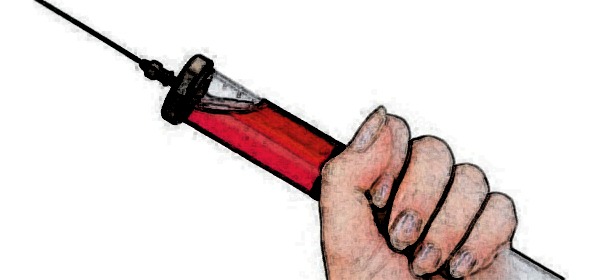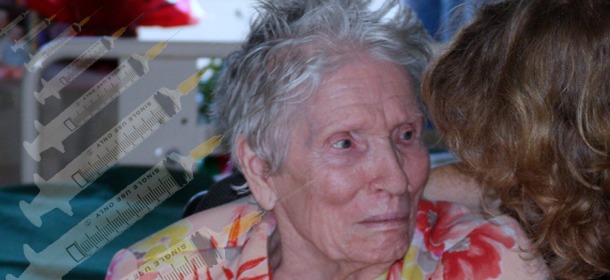Featured
Vaccine Theory Proven Wrong: Study by NIH
The assumption that antibodies are necessary to combat viral diseases has been taken as fact. This study, though, turns that assumption on its ear. Vaccines may, in fact, work against the body’s ability to combat disease.
A new study produced by the National Institutes of Health (NIH) documents that the basic theory behind vaccination is wrong. That should not be surprising, since it was never shown to be true. Of course, that little detail never stopped the vaccine pushers. Now, though, there’s direct evidence that their unfounded claims have never been based on anything but false pronouncements.
It is held that adaptive immunity, that is, the creation of antibodies, is necessary to protect against many diseases. This idea is central to vaccination theory. The study produced in the journal Immunity(1) found that, in the case of vesicular stomatitis virus (VSV), that is not true. In fact, the implication is that no antibody response can be effective against rapidly replicating viruses, especially those associated with skin breaks like tetanus.
B cells are lymphocytes, white blood cells, required to fight infections. The study found that, though they most assuredly are necessary, their ability to produce antibodies does not always have anything to do with survival. In the case of VSV, antibodies were useless in fighting the infection. It was, instead, the B cells’ ability to incite macrophages (literally “big eaters”) that is successful in beating the infection. The authors wrote:
The results presented here contradict the current view that B cell-derived neutralizing antibodies are absolutely required to survive a primary cytopathic viral infection, such as that caused by VSV. This paradigm arose originally from experiments in B cell-deficient mice (Bachmann et al., 1994, 1997;Bründler et al., 1996; Gobet et al., 1988), which lack antibodies, but also have abnormal lymphoid tissue architecture and altered macrophage phenotype. Our experiments in mice that lack antibodies but possess B cells and normal lymphoid tissues confirm that both B cells and antibodies are critical to survive a systemic infection after i.v. bolus administration of VSV. However, only B cells are essential when VSV is encountered via the more “natural” s.c. [subcutaneous] route, whereas antibodies are neither needed nor sufficient for protection. [Emphases mine.]
It could not be clearer than that! The assumption had been made that, since B cells are required to fight infections, then their ability to produce antibodies is the key. However, this study demonstrates that it was never more than an assumption. Instead, it’s the B cell’s ability to stimulate macrophages that does the trick, at least in some cases.
There is further proof that this evidence is correct. As Green Med Info noted(2), it has been well documented that high levels of antibodies are not necessarily protection against tetanus (lockjaw).
The authors of that study clearly state that the method of infection matters. The usual means of contracting tetanus is through a skin wound, in particular one that provides an anaerobic environment, as tends to be found in deep narrow wounds, like punctures. The body’s ability to fight a tetanus infection is more related to innate immune system functions, not acquired antibodies. The authors of this 1992 study state(3):
The diagnosis of tetanus, nevertheless, should not be discarded solely on the basis of seemingly protective anti-tetanus titers.
Implications
The authors discuss their results in terms of the rabies virus. It’s a close relative of the vesicular stomatitis virus studied. They also bring up the fact that other viruses transmitted in the same manner as rabies, such as Japanese encephalitis, and eastern and western equine encephalitis viruses, are becoming more common, implying that their results could be significant in understanding how to deal with these diseases. They note that:
Most viral pathogens, including rabies and VSV, must breach the body’s external barriers to cause disease.
The implication is that we may have a false sense of security through the use of vaccinations and, perhaps more significantly, they may also be doing harm to the immune system.
Autoimmune Limitations
It should be obvious that the immune system can do only so much. If it’s forced into action through vaccinations, that means less is left to respond to genuine threats. The massive amount of vaccination being done today, and increasing at an accelerating rate, has never been examined in scientific studies. It’s simply presumed to be safe—but that presumption is based on nothing but wishful thinking, or worse, a desire to convince the public that it’s true so they can get on with producing yet more vaccines.
Lack of Proof of Vaccine Efficacy
The elevated levels of antibodies produced by vaccines, known as titers, have never been demonstrated as effective in preventing disease. Now, we have strong evidence that, at least in some instances, they don’t. They may even have the opposite effect by causing B-cells to waste effort in producting antibodies when they could far more effectively direct the inherent defensive system.
Vaccines Are Synthetic
Vaccines do not produce natural immunity. This study documents that it matters. Natural is superior to synthetic. It’s now well known that vaccinations do not produce consistent immunity, nor does what immunity they produce last long. To work at all, they must include toxic substances and ingredients that can produce autoimmune diseases. This is all known to be true. The fact is that a form of rheumatoid arthritis is produced in rats(4) by injecting them with a vaccine adjuvant. To suggest that vaccines are harmless, or even relatively so, can only happen by refusing to acknowledge the overwhelming evidence otherwise.
We now have clear evidence that the theory behind vaccinations is simply wrong. Even if it should be true in some cases, it has never been demonstrated. One could hope that this combination of evidence against the theory and lack of evidence in favor of it would produce an immediate call from regulating agencies, like the NIH and CDC, to call a halt to vaccinations—at least until they can be proven to be safe and effective through independent studies.
One could hope that our health regulation agencies would do the right thing, but they haven’t before now, so this study will likely languish. Don’t expect to see any funding to duplicate it—unless they figure a way to use it to promote old vaccines or develop new ones.
Sources:
Tagged adaptive immunity vaccines, antibodies vaccines, b cells, b cells antibodies, b cells lymphocytes, big pharma, conventional medicine, modern medicine, nih vaccine study, pharmaceutical drugs, pharmaceuticals, science, synthetic immunity, vaccine, vaccine study, vaccine theory, vaccine theory wrong, vaccines, vaccines don’t work, vaccines synthetic immunity















Pingback: A Dose of Reality: Tetanus Vaccines Fail To Protect « The Mommypotamus The Mommypotamus
Pingback: Olympic Zion » Basis van vaccinatie theorie fout
Pingback: Preppers and Vaccinations – Page 2
Pingback: URL